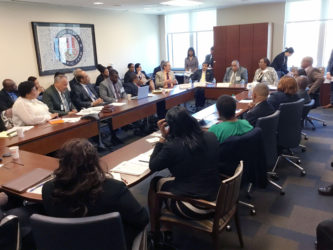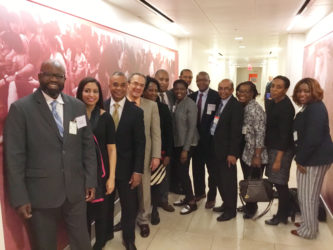The Guyanese Diaspora in the United States continues to play an important role in the broader Caribbean effort to strengthen and expand commercial relations between the United States and its Caribbean neighbours.
Those efforts are centred around a new law, the US Caribbean Strategic Engagement Act, signed in December by the then president Barack Obama, which provides for the design and implementation of new initiatives and programmes to enhance the relations between the US and the Caribbean.
This week, Chairman of the Private Sector Council of the Washington DC-based Institute of Caribbean Studies Wesley Kirton told Stabroek Business that “trade and investment have to be major components of our diplomatic relations and we in the diaspora have advanced a number of recommendations including that the United States facilitate market access for our agricultural produce, especially fruits and vegetables.” Kirton says that this can be achieved “through assistance with training that would help us meet the phytosanitary and other food safety requirements,” of the US.

Kirton, who is one of several diaspora Caribbean officials who participated in two recent meetings in DC with US administration officials, pointed out that the US enjoyed a trade surplus with Caricom countries of US$3.24 billion in 2014, and US$4.17 billion in 2015. “We need to be able to export more of our products to the US and have our trading arrangements expanded to include trade in services such as financial services,” Kirton said. “In Guyana’s case we can expand our exports of fruits and vegetables to the US if we have market access,” though he added that local farmers and exporters need to be clear about the phytosanitary requirements and to be trained to meet those requirements.
“We in the Guyanese American Chamber of Commerce (GACC) have had some consultations with the Liberty Avenue Economic Development Commission which is headed by Guyanese Vishnu Mahadeo and have determined that the import of fruits and vegetables into the US from Guyana for the ethnic market in New York City alone would amount to a US$10 million to US$15 million business annually. And the amount of revenue from these exports would be doubled if Guyana could supply product to satisfy the New York market in general,” Kirton said.

Kirton said recommendations put forward also include the need for a renewed focus on the agribusiness sector that would provide for US assistance in helping to diversify exports toward higher value-added products as well as facilitating farmer exchanges and the sharing of research and advanced technology for agro processing.
“These are important initiatives for Guyana notwithstanding the oil and gas discoveries which are being made and the potential revenues to be derived from the oil sector. Guyana’s agricultural sector can attract significant new investment and here we have recommended that the US provide support for countries in the region to continue their efforts at diversification and boosting productivity and competitiveness,” Kirton added.
Kirton said that such initiatives should be of particular interest to Guyana’s sugar industry as the country seeks a way to make it profitable once again through investment that would modernize it to ensure higher levels of efficiency as well as diversification.
Last week’s diaspora consultations with the US administration at the State Department involved representatives of a number of Guyanese organizations as well as Guyana’s Ambassador to the United States Dr Riyad Insanally, who is the current chair of the Caribbean Caucus of Ambassadors in Washington, DC.
The diaspora group has also submitted recommendations on energy, financial services, and information and communication technology which are designed to strengthen the business links between the region and the USA.
“The establishment of a single ICT space would benefit countries like Guyana through reduced mobile roaming charges,” Kirton said.
The US State Department and the US Agency for International Development (USAID) have until June to submit to the US Congress a plan of action for enhancing US-Caribbean engagement.









